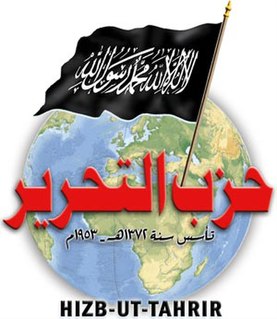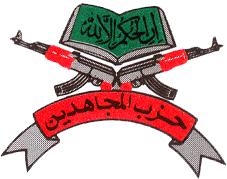
Hizb ut-Tahrir is an international pan-Islamist and fundamentalist political organization whose stated aim is the re-establishment of the Islamic caliphate to unite the Muslim community and implement sharia globally.

Islam is the largest and the state religion of the Islamic Republic of Pakistan. Pakistan has been called a "global center for political Islam". Pakistani nationalism is religious in nature being Islamic nationalism. Religion was the basis of Pakistani nationalist narrative.

Jaish-e-Mohammed is a Pakistan-based Deobandi Jihadist Mujahideen group active in Kashmir. The group's primary motive is to separate Kashmir from India and merge it into Pakistan. Since its inception in 2000, the group has carried out several attacks in the state of Jammu and Kashmir. It portrays Kashmir as a "gateway" to the entire India, whose Muslims are also deemed to be in need of liberation. After liberating Kashmir, it aims to carry its 'Jihad' to other parts of India, with an intent to drive Hindus and other non-Muslims from the Indian subcontinent. It has carried out several attacks primarily in the Indian administered Jammu and Kashmir. It also maintained close relations with Taliban and Al-Qaeda in Afghanistan and continues to be allied with these groups.

Hizb-ul-Mujahideen is an Islamist militant group operating in Indian-administered Kashmir. Its goal is to separate Kashmir from India and merge it with Pakistan. The group has claimed responsibility for multiple terror attacks in India. It has been designated as a terrorist group by the European Union, India, Canada, and the United States. It remains a lawfully-operating organisation in Pakistan; the group professes a radical right-wing Islamic ideology.

Tehreek-e-Jafaria (TJP) was a Shia militant group in Pakistan, which was founded in 1979 by Arif Hussain Hussaini. Its creation coincided with the enforcement of controversial Islamic laws by then President of Pakistan, General Mohammad Zia-ul-Haq. At the same time, 1979 Iranian Revolution in Shi'a Iran added extra confidence and comfort in the movement.
Masood Azhar is a radical Islamist and terrorist, being the founder and leader of the Pakistan-based terrorist organisation Jaish-e-Mohammed, active mainly in the Pakistani-administered portion of the state of Jammu and Kashmir. His actions are not limited to the South Asian region, for instance BBC News describing him as "the man who brought jihad to Britain." On 1 May 2019, Masood Azhar was listed as an international terrorist by United Nations Security Council.
The United Jihad Council, also known as the Muttahida Jihad Council (MJC), is a terrorist organisation formed by the Pakistan Army for unified command and control over the anti-Indian militant groups operating in Jammu and Kashmir. It was formed in the summer of 1994 and is currently headed by Syed Salahuddin, the leader of Hizb-ul-Mujahideen. The organisation was created to unify and focus efforts of various armed militant groups fighting against the Indian rule in Kashmir. This made distribution of resources like arms, ammunition, propaganda materials and communications more streamlined. It also made it easier to coordinate and pool resources of various militant groups to collect information, plan operations and strike at targets of military importance inside Indian administered Kashmir.
Harkat-ul-Jihad-al-Islami is an Islamic fundamentalist organisation most active in South Asian countries of Pakistan, Bangladesh and India since the early 1990s. It was banned in Bangladesh in 2005. The operational commander of HuJI, Ilyas Kashmiri, was killed in a US drone strike using a Predator drone in South Waziristan on 4 June 2011. He was linked to the 13 February 2010 bombing of a German bakery in Pune. A statement was released soon after the attack which claimed to be from Kashmiri; it threatened other cities and major sporting events in India. A local Taliban commander named Shah Sahib was named as Kashmiri's successor.

Al-Badr is an Islamic terrorist group operating in the Kashmir region. The group was allegedly formed by the Pakistani Inter-Services Intelligence (ISI) in June 1998. It is believed the group was encouraged by the ISI to operate independently from their previous umbrella group, Hizb-ul-Mujahideen (HM). Prior to the group's separation from HM, they participated in the fighting in Afghanistan in 1990 as part of Gulbuddin Hekmatyar's Hizb-l-Islami (HIG) alongside other anti-Soviet Afghan mujihadeen. India and the United States have declared it a terrorist organisation and banned it.
Sectarian violence in Pakistan refers to attacks and counter-attacks against people and places in Pakistan motivated by antagonism toward the target's sect, usually a religious extremist group. Targets in Pakistan include the Shia, Barelvis, Sunnis, Sufis, Ahmadis, and small groups of Deobandis. As many as 4,000 people are estimated to have been killed by Shia-Sunni sectarian attacks in Pakistan between 1987–2007. And since 2008, thousands of Shia have been killed by Sunni extremists according to Human Rights Watch (HRW). One significant aspect of the attacks in Pakistan is that militants often target Sunni and Shia worshipping places during prayers in order to maximize fatalities and to "emphasize the religious dimensions of their attack". Human Rights Watch also states that in 2011 and 2012 Pakistan minority groups; Hindus, Ahmadi, and Christians "faced unprecedented insecurity and persecution in the country". Attacks on Sufi shrines by Salafis have also been reported.

Shia and Sunni Islam are the two major denominations of Islam. They chose sides following the death of the Islamic prophet Muhammad in AD 632. A dispute over succession to Islamic prophet Muhammad as a caliph of the Islamic community spread across various parts of the world, which led to the Battle of Jamal and Battle of Siffin. After the death of Prophet Muhammad, Muslims had a disagreement. Sunnis believed that Muhammad's successor should be Abu Bakr and Omar, and the Shias believed that his successor should be Ali. The dispute intensified greatly after the Battle of Karbala, in which Hussein ibn Ali and his household were killed by the ruling Umayyad Caliph Yazid I, and the outcry for revenge divided the early Islamic community, which is known today as Islamic schism to differ from Christian schism that happened later.

Imamia Students Organization is the largest Shiite Muslim students' organization in Pakistan. It was founded by Ayat ullah Syed Murtaza Hussain Sadar ul Fazil, Molana Agha Ali Mosvi Molana Safdar Hussain Najfi, Shaheed Doctor Syed Muhammad Ali Naqvi on 22 May 1972 at University of Engineering and Technology, Lahore. In 2013, it has "around 2500 units in Pakistan," covering all the four provinces of Pakistan, Federally Administered Tribal Areas, Azad Kashmir and Gilgit-Baltistan.

Shaikh Muhammad Hussain Najafi is a Pakistani Twelver Shia Marja. At the present there are three maraji of Pakistani descent, the first one is Basheer Hussain Najafi, second one is Hafiz Syed Riaz Hussain Najafi and the third is he himself. As Basheer Hussain Najafi has chosen to reside in Najaf, Iraq, Muhammad Hussain Najafi and Syed Riaz Hussain Najafi are the only marja in Pakistan. He is running Hawza in Sargodha.
He has been included in the last 5 editions of "The Muslim 500: The World's Most Influential Muslims" since 2010. He is one of the 9 marja's mentioned in the most recent edition.

Haq Nawaz Jhangvi was a Pakistani cleric who founded the Anjumane Sipahe Sahaba on 6 September 1986.

Shia Islam was brought to the Indian subcontinent during the final years of the Rashidun Caliphate. The Indian subcontinent also served as a refuge for some Shias escaping persecution from Umayyads, Abbasids, Ayyubis and Ottomans. The immigration continued throughout the second millennium, until the formation of modern nation states. Shi'ism also won converts among the local population. Shia Islam has a long history and deep roots in the subcontinent. However, the earliest major political influence was that of the Shia dynasties in Deccan. It was here that the indigenous and distinct Shia culture took shape. After the conquest of Golconda by Aurangzeb in the 17th century, and subsequent establishment of hereditary governorship in Awadh after his death, Lucknow became the nerve center of Indian Shi'ism. In the 18th century, intellectual movements of Islamic puritanism were launched by Muhammad ibn Abd al-Wahhab in Najd and Shah Waliullah and his sons, with Shah Abdul Aziz being the main flag-bearer of modern anti-Shi'ism in Delhi. These movements coincided with the beginning of the British conquest of India and the downfall of Shia dynasties in Bengal and Awadh. These factors caused the onset of continuous persecution of the Shia community and laid the foundations of organised violence against them, that has become a part of Shia life in the Indian Subcontinent, especially Pakistan.
Islam is an Abrahamic monotheistic religion teaching that there is only one God (Allah) and that Muhammad is His last Messenger.

Anti-Shi'ism is hatred of, prejudice, discrimination, persecution and violence against Shia because of their religious beliefs, traditions and cultural heritage. The term was first defined by Shia Rights Watch in 2011, but it has been used in informal research and written in scholarly articles for decades.

The 1988 Gilgit massacre refers to the state-sponsored mass killing and rape of Shia civilians in the Gilgit District who revolted against military dictator Zia-ul-Haq's Sunni Islamist regime, responsible for vehement persecution of religious minorities as part of its Islamization program.

Majlis Wahdat-e-Muslimeen Pakistan (MWM) is a Pakistani Shi'a political organization. Its headquarters are in Islamabad. MWM Pakistan works to establish an Islamic democratic welfare state, particularly emphasising Shi'a-Sunni unity.
A non-denominational Muslim is a Muslim who does not belong to, does not self-identify with, or cannot be readily classified under one of the identifiable Islamic schools and branches.












